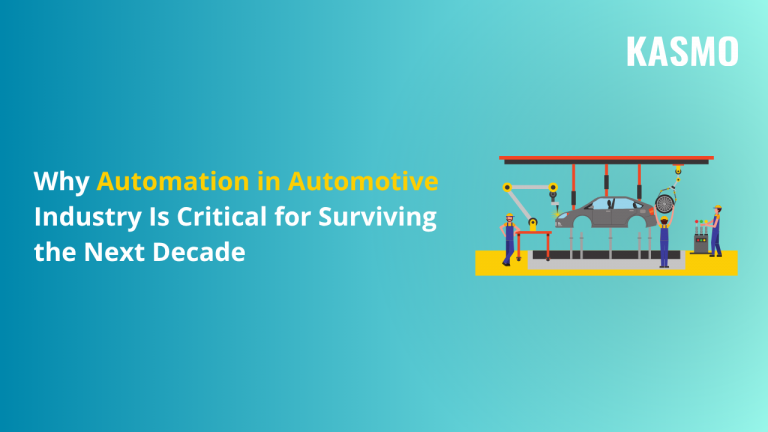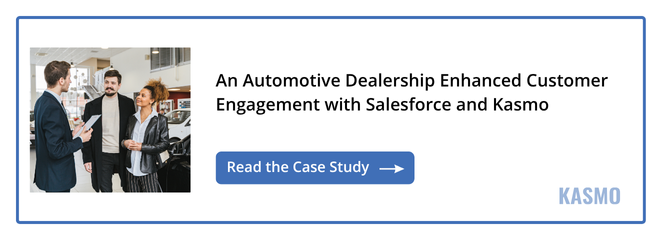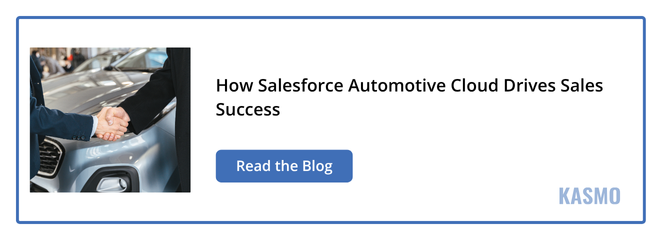Role of Automation in Automotive Industry
Automakers and OEMs are driven by innovations such as autonomous vehicles and deploying automation in automotive businesses with Salesforce Agentforce. These shifts are not only redefining personal transportation but are also compelling traditional automakers to rethink how they build, sell, and manage cars.
Despite years of attempting to perfect the manufacturing and supply chain, the current situation in automotive businesses doesn’t look favorable for them if they want to sustain themselves in this competitive market. With vehicle sales declining and customer demands intensifying, manufacturers are investing heavily in Salesforce Agentforce.
Data-Driven Automation for Decision-Making
Automation in the automotive industry is helping leaders go beyond automating administrative tasks. With digitization and AI Agents, automotive businesses can now store, manage, access, and analyze huge volumes of data. With IoT sensors and numerous customer engagement platforms, automotive businesses are getting overwhelmed with huge volumes of data.
AI Agents leverage this data and predict machinery failures, optimize driving patterns, and empower automotive businesses to personalize the driver experience. With advanced analytics and predictive modeling, manufacturers and OEMs now shift from proactive to reactive customer services. AI agents integrated with your CRM platform will help you personalize marketing campaigns based on a customer’s buying behavior, increasing lead conversion and enhancing the customer experience.
Intelligent Automation Across
With custom AI solutions, automotive businesses can suggest logistics based on real-time context. Integrating AI agents with connected services like sensors in cars and electric vehicles, help automotive businesses to reduce operational costs, uncover and venture to new monetization avenues, minimize inventory waste, and prepare their business to handle any unfortunate circumstance easily without incurring significant loss.
AI in Automotive Industry: Accelerating Business Growth and Digital Transformation

Source: Tata Elxsi
The adoption of AI in automotive industry is helping businesses with innovations, enhanced productivity, and faster digital transformation. With automation and connectivity, AI is driving smarter operations across design, production, logistics, customer service, and even in-vehicle experiences.
Reducing Equipment Failure and Maintenance Costs
Unexpected equipment failure on the manufacturing line can cause significant operational and financial setbacks. AI-powered predictive maintenance tools utilize sensors and machine learning algorithms to detect anomalies before they lead to major breakdowns. These systems can distinguish signal from noise, forecast failures, and suggest proactive measures to extend asset life.
According to research by McKinsey, leveraging AI leads to – “20 percent increase in equipment availability, up to 25 percent lower inspection costs, up to 10 percent lower total annual maintenance costs”.
AI-Enhanced Quality Control
Traditional quality control methods are prone to human error and environmental inconsistencies. Leveraging AI agents help automakers to accurately detect surface defects or misaligned setups. Agentforce’s AI agents continuously learn and improve, enabling faster and more reliable assessments of machined parts and other car equipment. Integrating AI agents with your automotive business can “detect defects up to 90 percent more accurately than humans”.
Leaner and Smarter Supply Chains
Leveraging AI for inventory management has different perks of its own. AI-powered tools and applications can synthesize data from sources like demand signals, weather forecasts, and ad campaigns to predict supply chain demands with accurate precision. This “reduces forecasting errors by 30 to 50 percent”. With AI and automation, automotive businesses can also “reduce overall inventories by 20 to 50 percent, generating a cascade of cost savings by eliminating the transport, warehousing, and supply-chain administration of unneeded goods”.
AI in Autonomous and Assisted Driving
AI is already enhancing driver assistance technologies like lane departure warnings, adaptive cruise control, and emergency braking. Using AI agents to interpret data from multiple sensors and make real-time driving decisions helps automotive businesses personalize the in-vehicle experience.
Predictive Analytics for Proactive Decision-Making
Using AI-powered predictive analytics, automakers can anticipate maintenance needs, optimize parts demand, and enhance fleet management.
Enhanced Customer Experience and Improving Service
AI is transforming automotive sales and service. Smart dealerships use digital platforms like Agentforce that identify prospects, send personalized communications, and streamline the auto buyer’s journey. AI agents offer 24/7 support, helping customers schedule services or resolve issues with natural language interactions. These AI agents enhance customer engagement, optimize the dealer experience, predict customer needs, and enable hyper-personalized marketing efforts.
You Need to Leverage Agentforce for Effortless Automation in Automotive Business?
Lightning-Fast Customer Support
Agentforce retrieves data across tools and other clouds in seconds, enabling faster resolution of issues, whether it is a service request, repair scheduling, or financing query. In an industry where every second counts, these agents also help businesses enhance their post-sale service, reducing wait times and customer churns.
Smarter and More Accurate Assistance
By consolidating data from disparate sources like customer history, service logs, product manuals, Agentforce delivers smarter insights to human agents in real time. This results in faster case resolutions, more accurate answers, and an increase in retention rates.
Enhanced Employee Efficiency with Customer Service Agents
Repetitive administrative tasks like updating vehicle records, pulling up service histories, or drafting follow-up emails consume a lot of time for a human agent. Agentforce automates these routine processes, allowing your team to focus on high-value tasks, like complex customer issues or identifying cross-selling and upselling opportunities.
Personalized Experiences That Boost Customer Satisfaction
Agentforce understands each customer’s interaction history, vehicle type, past concerns, and service preferences. This context allows human agents to deliver personalized responses that increase customer satisfaction, brand trust, and loyalty.
Improved Operational Efficiency
Deploying Agentforce helps automotive businesses lower operational costs and improve service quality. Automation in automotive businesses ensures scalability and consistency across multiple channels, like showrooms, service centers, or digital support platforms.
Conclusion
Automation in automotive industry is not just about enhancing how vehicles are manufactured, it’s transforming the sales, service as well as marketing aspects of the business. Leveraging Salesforce’s Agentforce helps automotive businesses streamline and improve design, production, logistics, customer experience, and after-sales service.
As the future of automotive leans toward electric, autonomous, and connected vehicles, intelligent automation in the form of AI agents will help companies achieve operational excellence and empower them to create hyper-personalized, scalable, and advanced solutions for their customers.






